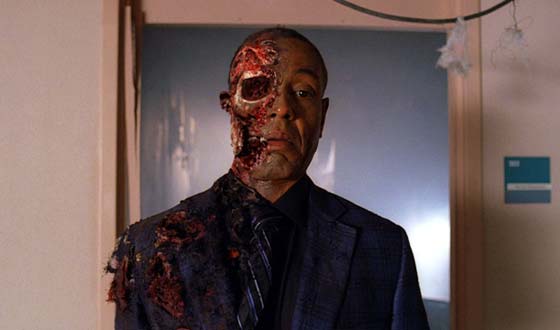Although I am not a neurologist, I have studied neurology, and here are my thoughts based on what I know.
If you care to notice, although the explosion seems to be violent enough to damage a person much more badly than Gus seems to be, when we get a close-up of his face, his skull seems intact save for a piece of his lower jaw missing. Other than the lower jaw injury, it seems his head wounds are superficial enough not to be life-threatening. Thus, independent of how severely he should be injured as a result of such an explosion, his brain is most likely intact, although the bit of the brain that houses the hypothalamus and the pituitary gland are exposed through the eye socket. However, as far as I know, the hypothalamus and the pituitary gland are not involved in voluntary movement such as walking and in planning neurologically involved movement sequences such as adjusting a tie. Thus far, the story checks out.
However, upon close inspection, movement of the intact eye and facial expression seem unaffected as well, which is where we run into trouble. The damaged side of Gus' head has cranial nerves running through it, and these nerves exit the skull at various points and are found outside the skull (unprotected and badly exposed). All his cranial nerves on the right hemisphere are thus damaged. These nerves control movement of the face, of the eyes, of eyelids, the jaws, the oesophagus (breathing), the tongue, swallowing, etc., and even the functioning of some thoracic and abdominal organs. At the very least, Gus' face should be twitching uncontrollably and/or he should be gagging, biting his tongue off, etc.
So the part about him being able to walk and adjust his tie checks out--but the part about his face being so calm and rather normal does not.
I believe this is poetic justice in all its glory. We are shown over the few last seconds of Gus' life just how much of a sociopath (and not psychopath--he shows too much emotion to be a psychopath in various scenes) he is, just how non human he is. Even despite the obvious pain and distress his injuries should cause, he is still able to worry about and to prioritize adjusting his tie, that is, keeping up appearances and looking classy even while dying. The point of a sociopath's life is to win, no matter what it takes, and a sociopath is willing to be absolutely reckless, to the point of risking their life, to win. This idea might be what the screenplay was going for.
Another little detail that people seem to have glossed over is the very deep wounds Gus has sustained on his shoulder, right where his subclavian artery and vein are. These artery and vein are among the most important ones of a mammalian body. Even if only superficially injured, they should be projecting blood. The subclavian artery is extremely important in supplying blood (oxygen) to the brain, so even if the brain itself is intact, it should malfunction in a matter of seconds as a result of this type of injury. Luckily, Gus does collapse fairly rapidly, although it takes him a full thirty seconds from the time of the explosion to do so, which seems rather long to me. This might still be part of the plot device that suggests that Gus is cold-blooded, that is, he has rather low blood pressure to begin with, making the blood pressure differential when losing blood lower in his case.
I love Gus' character. However, at various times, his sociopathy seems inconsistent with reality. People don't become sociopaths as adults, yet, in one scene where Gus seems to be well into his thirties or even forties, he cries uncontrollably when his chemist protégé dies, suggesting Gus wasn't always Gus. I believe that the Salamanca brothers' sociopathy is much more credible.
I never tire of this show!

